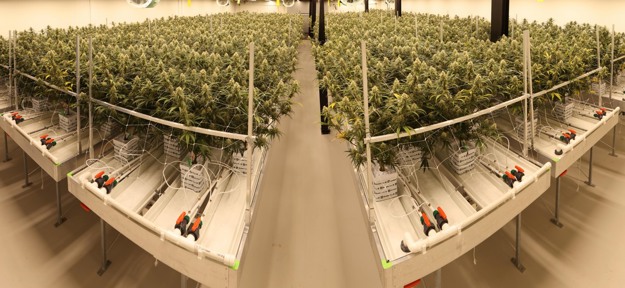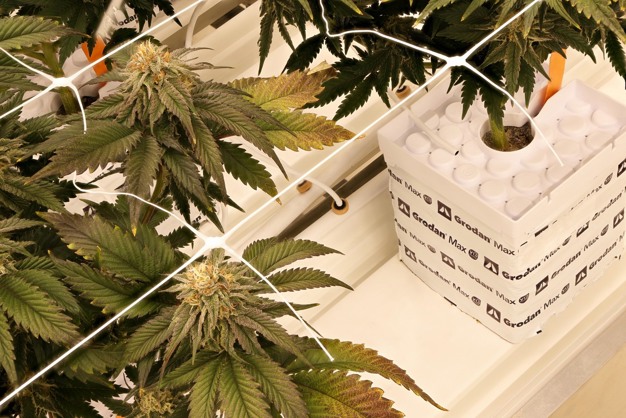FYTA is one of ten designated producers of cannabis to be involved in the 'experiment' by the Dutch government. The pilot project is aimed at establishing whether a controlled supply chain can offer a possible alternative to the country's current tolerance policy. Thanks to Grodan's stone wool growing media, FYTA is ideally poised to rapidly scale up its production activities when the project is rolled out to other municipalities later this year.
The government in the Netherlands tolerates the sale of cannabis products to consumers through the country's network of 'coffeeshops'. Under this policy, there is no criminal penalty for sale or recreational use, but the production and supply is not tolerated and is therefore illegal. This approach has brought its own set of problems with regard to public order, public health and crime, which the government is keen to address. Therefore, the 'experiment' has been set up to provide a controlled supply to coffee shops in participating municipalities. FYTA is one of ten designated growers chosen to produce the cannabis products for this pilot project.
Proud moment in a long journey
"We made our first deliveries to coffee shops in Tilburg and Breda on 15 December 2023. That day was a proud moment for all of us, especially because the feedback has been positive in terms of the quality and taste of our products," explains Jordan van Berkel, Master Grower at FYTA. "It also marked a key milestone in what has been a long and challenging journey for us, which started when we embarked on the selection procedure back in July 2020."

"One aim of this experiment is to regulate the product quality, in order to ensure that no illegal or unsafe crop protection chemicals have been used during cultivation, for example. Therefore, our products are rigorously tested in certified laboratories. We had started out growing our plants in soil. However, we increasingly found that the bacterial life in soil made it difficult to guarantee the end quality with regards to microbiology, and whole batches were sometimes being rejected," he adds.
Complete switch to stone wool
"One of my colleagues suggested trying Grodan's stone wool, which as an inert substrate does not contain any organic matter. We ran a small trial and were so impressed with the results that we decided to completely switch to stone wool," continues Jordan. "My professional background is in growing shrubs for nurseries, so I had never worked with stone wool before. Therefore it was quite a big transition for me, because we had to change our complete climate and irrigation strategy."
One challenge was to find the sweet spot in the climate, he explained: "It took us a while to maintain enough airflow in the room without drying out the block – especially at night time. But once we had got the humidity right, it became easier to fine-tune the irrigation in combination with the lighting strategy."

New insights into steerability
"Thankfully, we've received a lot of support from the experts at Grodan, including cultivation guidelines, weekly irrigation schedules and regular visits. They are very willing to share their knowledge and experience, including the insights they gain from working with other growers of cannabis crops around the world," Jordan says.
"And they are always on hand to help – not only if we have any specific questions or problems, but also with advice on how to further optimize crop performance. For example, they recently suggested trying a different approach to some of our more vegetative varieties – using the EC to steer them more generatively at the start, and then changing to gentler, more vegetative steering later. This has given us interesting new insights into how we can leverage the steerability of stone wool to our advantage," Jordan says.
Mother plants stay stronger for longer
The results have been so satisfactory that FYTA recently transferred its mother plants onto stone wool too. "Now that we have gained experience with stone wool in the vegetative stage, we feel confident about using Grodan's Uni-Slabs in our mother room. This will make things much easier for us, not only due to the steerability but also in terms of keeping the plants healthier," he states.
"We maintain numerous varieties in our mother room, and they all have slightly different preferences and sensibilities. Stone wool gives us more control over the root zone, making it easier to maintain the right balance in the substrate. I'm confident that we can get the mother plants off to a better start and keep them stronger for longer on Grodan's slabs," comments the Master Grower. "And as an extra bonus, stone wool helps us to keep our whole facility cleaner, which enables us to meet the strict hygiene requirements with less effort and lower costs," he adds.

Foundation for rapid scaling up
Another key benefit for FYTA is that stone wool provides a strong foundation for consistent, predictable and repeatable results. "When using stone wool, you know that you can grow all the plants under precisely the same conditions, and that you will get the same results with your entire crop, every time. This will be particularly important for us when we scale up to full capacity," says Jordan.
Importance of data
As part of the preparations for that moment, multiple GroSens sensors have been installed in each room. "This gives us a better picture of what's really happening in the rootzone at every stage, and not just in one plant, so that we can standardize the irrigation strategy and guarantee more uniformity," he comments.
As a next step, FYTA is planning to implement Grodan's eGro data platform in the near future. "As we scale up, data will become even more important to help us 'grow based on feeling, but steer based on numbers'. We are looking forward to knowing exactly what the plants are dealing thanks to being able to see the complete picture of climate and irrigation in a single system – including remotely using the app when we're not at work," Jordan continues.
"Additionally, the platform will support our management reporting and performance analysis to help us to keep our commercial activities on track, which is of course crucial for longer-term success within this project," he concludes.
For more information:
Grodan
grodan101.com










